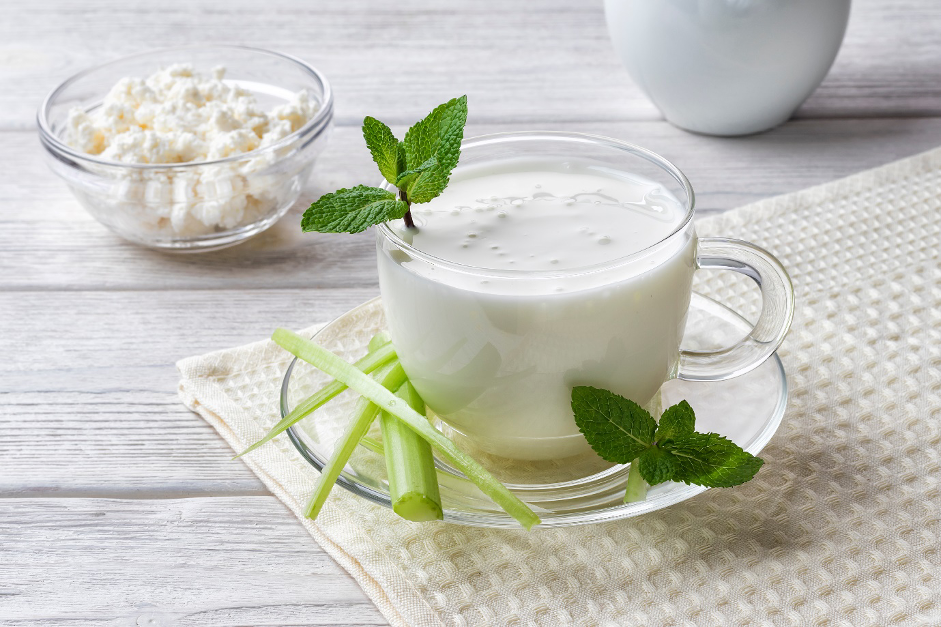Kefir is a fermented food or beverage that is often produced from milk. It tastes similar to yoghurt but has a more sour, acidic flavour. Kefir grains are a naturally occurring mixture of yeasts, bacteria, and other organisms used for hundreds of years to make Kefir milk. Furthermore, Kefir includes millions of probiotics, which are microorganisms that may provide health advantages. It is also minimal in lactose and high in minerals and vitamins, which benefit your health.

Kefir has been linked to various health advantages, such as better gastrointestinal health, blood sugar and cholesterol management. It is also known for assisting with weight reduction. Continue reading to learn more about Kefir.
What Are The Health Benefits Of Kefir?
Kefir, a traditional meal across various cultures worldwide, has grown in popularity in the natural healthcare system because of its multiple health and wellness advantages. Here are a few of them:
Excellent Provider Of Several Nutrients
Kefir is thought to have developed in portions of Southwest Asia and Eastern Europe. It comes from the Turkish term keyif, which means feeling well after eating. This fermented beverage was produced initially using goat’s or cow’s milk. It is prepared by combining milk with kefir grains. These are not cereal grains but grain-like populations of lactic acid bacteria and yeasts that look like cauliflower.
In addition, the bacteria in the kefir grains ferment and increase the carbohydrates in the milk for around one day, converting it to Kefir milk. The grains are then taken from the water and may be reused. Kefir milk includes several bioactive compounds, such as peptides or organic acids, which add to its health advantages. It is high in B vitamins, protein, and calcium.

Has More Probiotics Than Yoghurt
When consumed, certain microbes may be suitable for one’s health. Probiotics can benefit health in various ways, including mental wellness, weight control, and digestion. Although yoghurt is the most well-known probiotic meal in the Western diet, Kefir is a considerably more effective source.
Furthermore, kefir grains could comprise up to 61 different types of yeasts and bacteria, making them a rich and varied probiotic source. However, this richness varies. Some fermented dairy products use lesser strains and do not involve yeast. Kefir milk contains up to 61 distinct bacteria, allowing it a significantly more effective probiotic source than numerous other fermented dairy foods.
Has Powerful Antimicrobial Capabilities
Kefir contains probiotics that are thought to defend against illnesses. This includes the kefir-specific probiotics kefiri. Also, this probiotic has been shown to suppress the development of various dangerous bacteria, such as E. coli, Helicobacter pylori, and Salmonella. Kefiran, a kind of carbohydrate found in Kefir, is also antimicrobial. Moreover, Kefir includes the probiotic Lactobacillus kefiri and the carbohydrate kefiran, which both help safeguard the body from dangerous germs.
Promote Bone Health And Reduce The Risk Of Osteoporosis
Osteoporosis is a major problem in Western nations that are characterised by bone tissue degeneration. It is widespread in older women and significantly raises the likelihood of fractures. Consuming enough calcium is among the most efficient strategies to enhance bone health and halt the onset of osteoporosis. Full-fat Kefir is high in vitamin K2 and calcium, which are essential for calcium metabolism. K2 supplementation has been demonstrated to lessen your fracture probability by up to 81%.
Moreover, Kefir has been linked to enhanced absorption of calcium in bone cells in animal experiments. This results in increased bone density, which must aid in preventing fractures. Kefir manufactured from dairy is high in calcium, and full-fat dairy kefir includes vitamin K2. These minerals are very beneficial to bone health.
Cancer-Protective
Cancer is among the top causes of mortality worldwide. It happens when your body’s aberrant cells develop uncontrolled, like in a tumour. Probiotics in fermented dairy foods inhibit tumour development by boosting your immune system. As a result, it is conceivable that Kefir milk might help fight cancer. Numerous test-tube experiments have proven this protective function.
According to one research, kefir extracts decreased the number of breast cancer cells by 56%, whereas yoghurt extraction only lowered the amount by 14%. Remember that human analysis is required before reaching definitive results. Kefir has been shown in animal and test-tube tests to suppress cancer cell development. However, recent studies have yet to involve individuals, indicating that additional research is required.
Assist With Various Digestive Issues
Kefir and other probiotics could assist in maintaining the equilibrium of friendly bacteria in your intestines. This explains why they are so efficient in treating various types of diarrhoea. Furthermore, a large body of evidence implies that probiotics foods and probiotics may help with various digestive issues.
Ulcers caused by H. pylori infection, IBS, and various other conditions are among them. As a result, Kefir could be beneficial when it comes to digestive issues. Probiotics, such as Kefir, can help with various diarrhoea symptoms. They can also help with a variety of digestive problems.
Contains Little Lactose
Lactose is a natural sugar found in dairy products. Numerous individuals, particularly adults, cannot appropriately decompose and fermentable lactose. Lactose intolerance is the medical term for this condition. Lactic acid bacteria in the fermentation process of dairy foods such as yoghurt and Kefir convert lactose to lactic acid. Therefore, these foods contain much less lactose than milk. They also have enzymes that could aid in the further breakdown of lactose.
As a result, Kefir is often well accepted by persons with lactose sensitivity compared to ordinary milk. Remember that you may produce lactose-free Kefir utilising fruit juice, coconut water or any non-dairy drink. Kefir has less lactose since its lactic acid bacteria have previously digested it. Lactose-intolerant people may commonly consume Kefir without issue.
Helps With Asthma And Allergy Problems
Allergic reactions are the result of inflammation to specific foods or chemicals. Individuals with hypersensitive immune systems are more susceptible to allergies, which may also lead to asthma-related illnesses. Furthermore, animal research shows that consuming Kefir milk may lessen allergy symptoms.
Conclusion
Kefir is a multipurpose fermented food high in probiotics and beneficial minerals. Despite its reputation as a healthful diet, much of the study on Kefir milk has been conducted in laboratories or on animals, with no human participants. Nonetheless, Kefir shows promise in domains such as blood sugar management and intestinal health, and it is usually considered safe for most individuals.
